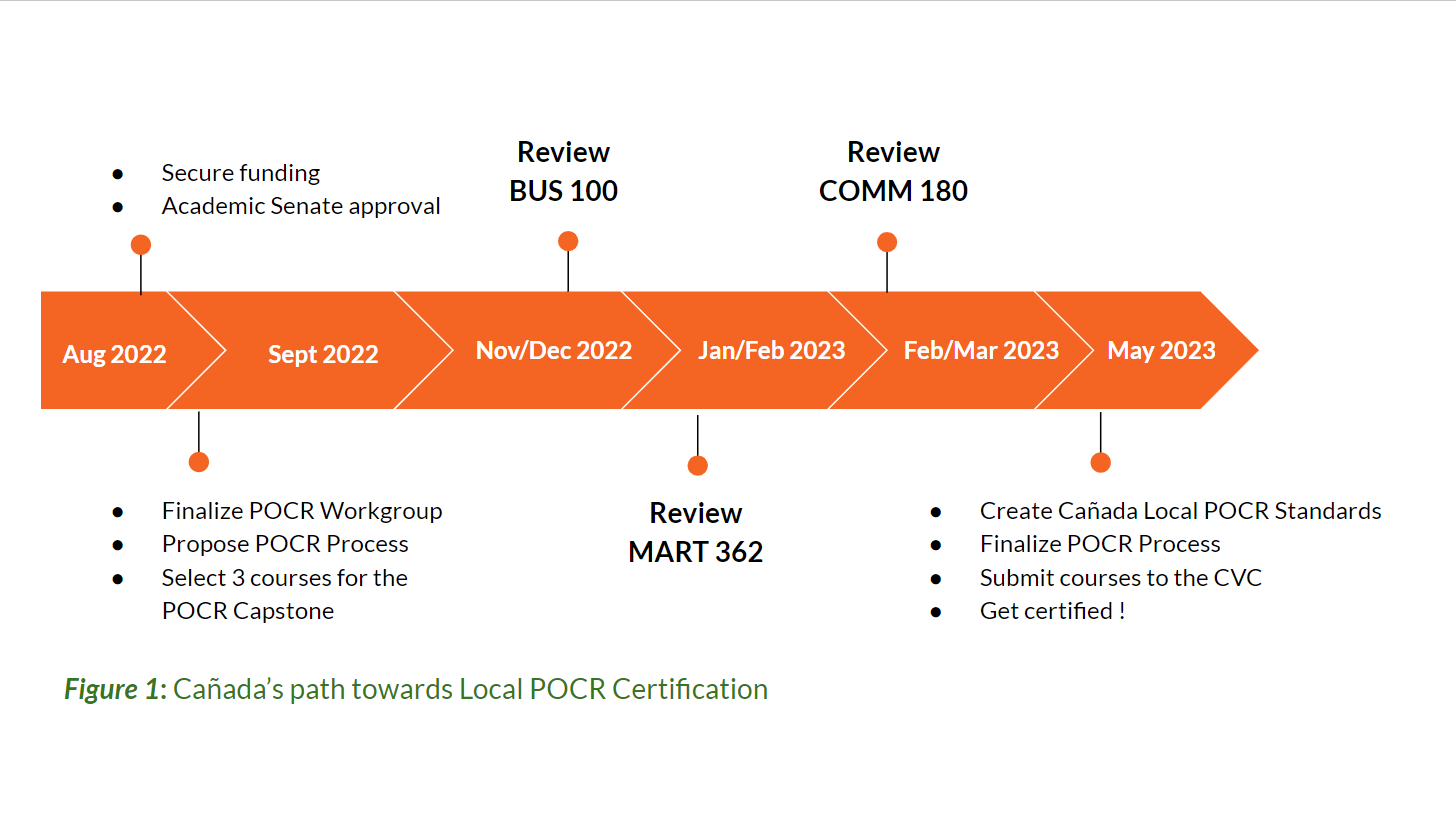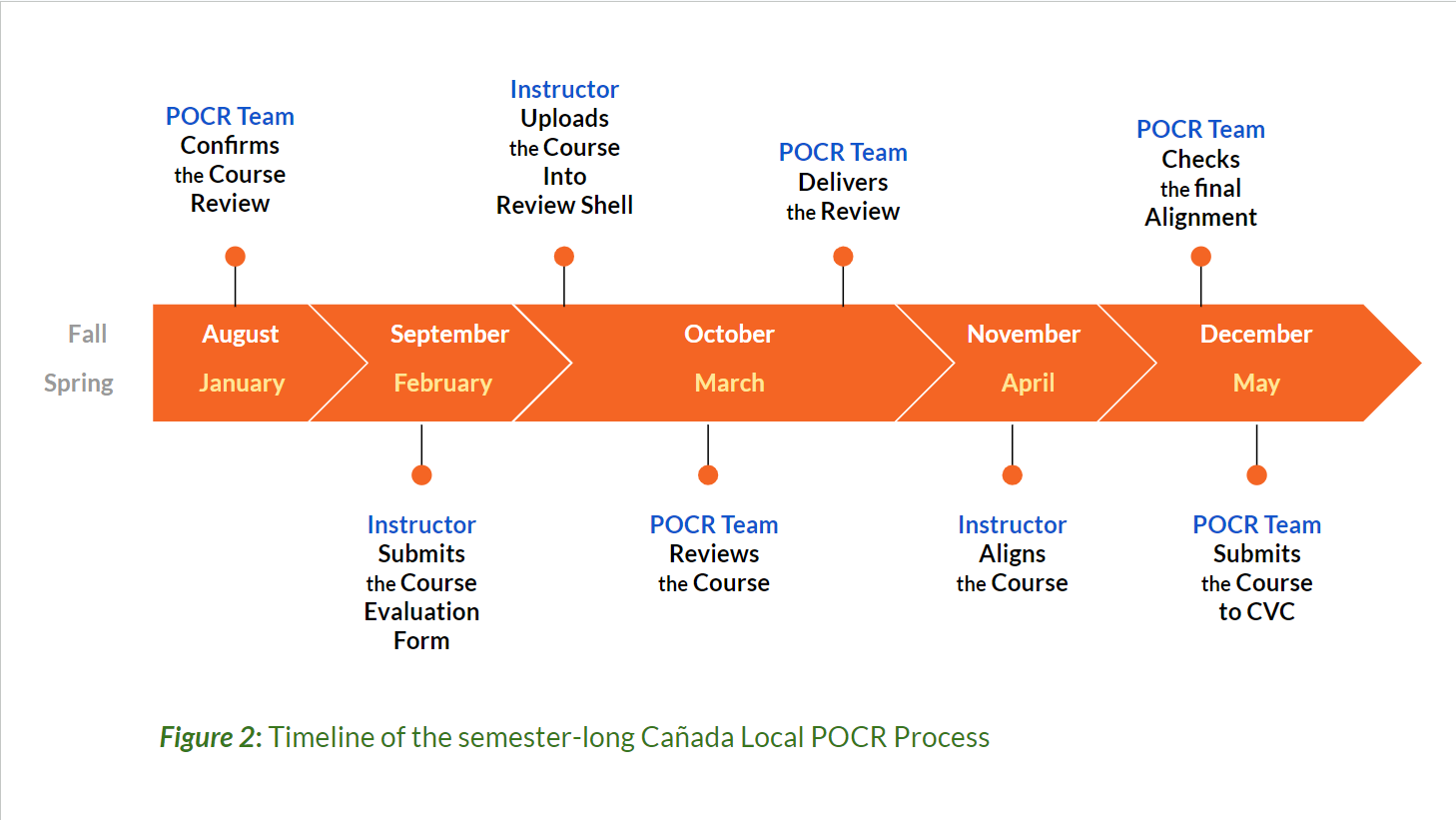POCR
 |
What is POCR?Peer Online Course Review (POCR) is the initiative of California Virtual Campus (CVC). Certified POCR reviewers use the POCR process to review online courses based on the criteria compiled in the CVC-OEI Rubric. Such course alignment increases course quality and accessibility, and closes persistent equity gaps in online courses. |
Cañada Local POCR
During the academic year 22/23, Cañada’s certified POCR reviewers formed a workgroup that entered the CVC’s certification process called the POCR Capstone. This two-semester process (Figure 1) awarded Cañada College with the Local POCR Certification. The Cañada POCR team can now review courses via the Local POCR Process. At the process completion, such courses receive a quality-reviewed (QR) badge, internally, without the CVC’s supervision. QR courses are entered into the CVC Course Exchange and will eventually become available for statewide enrolment, pending Home & Teaching College Initiative approval (in progress).

The Local POCR Process grants the course under review a Quality Reviewed (QR) badge. QR-courses are:
- fully accessible
- built consistently
- highly organized
- equitable & inclusive
- engaging
- aligned with the SLOs / course objectives
When students use search engines to look for courses offered statewide in the CVC Course Exchange, the QR-courses appear at the top of the search list.
At Cañada College, faculty who successfully align their online course via the POCR Process are awarded with a compensation stipend.
The benefits of the POCR Process help both students and instructors! Our reviewees have summarized an extensive list of benefits in the Testimonials section.
Cañada Local POCR Process
- Usually semester-long
- Takes place twice per academic year (Fall & Spring semesters)
- Reviews 3-5 courses per semester (depending on the funding and reviewer availability)

Table 1: Approximate timeline for each semester. Timeline may change based on the alignment needed. Visual version presented in Figure 2.
|
Fall Semester |
Spring Semester |
|
|
Course is confirmed for review |
August |
January |
|
Instructor submits course evaluation form |
September |
February |
|
Course is uploaded into review shell |
October |
March |
|
Course is reviewed by the POCR team |
||
|
Review is delivered to the instructor |
||
|
Instructor aligns the course |
November |
April |
|
Aligned course undergoes the final check |
December |
May |
|
Course is submitted to the CVC |
When you, a Cañada faculty member, contribute your online course into the Cañada Local POCR Process, you become a reviewee. Our Local POCR team will help you determine whether your course is ready. The recommendation is to do this initial evaluation well in advance, for example, at the end of the Spring semester for the Fall Review (and vice versa).
At the minimum, your course should meet the following criteria:
- It is a fully online course (synchronous or asynchronous)
- Course shell is authored solely by you, the instructor
- Publisher materials represent no more than ⅓ of the course content
- Course already meets many of the CVC-OEI Rubric criteria
- You have taken QOTL (or equivalent) and are enthusiastic about the course review
We encourage you to take the first step now!
Please contact Cañada POCR Lead Nada Nekrep at nekrepn@smccd.edu
We are here to support you through the entire process!
Table 2: Active team members as of F24 (alphabetically)
|
Team Member |
Division |
|
Role |
|
Kristina Brower |
BDW |
brower@smccd.edu |
Reviewer |
|
Tracy DeHaan |
HSS |
dehaant@smccd.edu |
Reviewer |
|
David Eck |
HSS |
eckd@smccd.edu |
Reviewer |
|
Sarah Harmon |
HSS |
harmons@smccd.edu |
Reviewer |
|
Robin Lise-Nielsen |
ST |
lisenielsenr@smccd.edu |
Reviewer |
|
Nada Nekrep |
ST |
nekrepn@smccd.edu |
POCR Lead & Reviewer |
|
Marina Noel |
BDW |
noelm@smccd.edu |
Reviewer |
|
John Perez |
HSS |
perezj@smccd.edu |
Reviewer |
Table 3: Cañada QR-badged courses (Cañada CVC Dashboard)
|
Course |
Division |
Semester Certified |
Course Contributor |
|
BUS 100 |
BDW |
S23 |
Candice Nance |
|
MART 362 |
BDW |
S23 |
Emanuela Quaglia |
|
COMM 180 |
HSS |
S23 |
John Perez |
|
COMM 110 |
HSS |
F23 |
John Perez |
|
ENGL/LING 200 |
HSS |
F23 |
Sarah Harmon |
|
BUS 201 |
BDW |
F23 |
Candice Nance |
|
SOCI 105 |
HSS |
S24 |
Tracy DeHaan |
|
SOCI 100 |
HSS |
S24 |
Tracy DeHaan |
|
ECE 211 |
HSS |
S24 |
Kristina Brower |
|
BIOL 130 |
ST |
S24 |
Robin Lise-Nielsen |
Participating in the POCR process has been the most transformative experience of my teaching career. POCR is a unique process that allowed me to drill down to the fine details of my course and receive meaningful feedback from my peers. I was able to improve student performance, engagement, and accessibility. These changes have benefited my students and helped to support campus DEI goals. The changes also helped to lessen my workload. Since the POCR process improved my course navigation, feedback process, and course communication, there is more clarity for students. This has resulted in a reduced number of emails. Finally, participating in POCR increased my passion for teaching. It’s exciting to learn new tools, implement them, and experience gratification for the effort you’ve put in.
~ Prof. Tracy DeHaan
The POCR process has been an enlightening experience, deepening my understanding of online pedagogical design and implementation. With each course I submit for review, I continue to learn current industry practices to benefit my students. My peers have provided substantive feedback with suggestions on revising and improving my online courses. What I’ve learned through this process, I have used also to improve my in-person teaching so all students benefit from this training. Thanks to the POCR review team for their patience and mentorship through the entire process.
~ Prof. Candice Nance
I have been teaching distance education modalities (hybrid, online synchronous, and online asynchronous) since 2010 and at multiple colleges and universities. I entered the POCR process knowing some solid best practices…but nothing compared to what I learned while going through the POCR process. Putting my course through POCR allowed me to think about the course through the eyes of my students—and that allowed me to see gaps that I had never observed before. As a result, I know my students will find more opportunities to engage with each other and to apply the knowledge that the course brings in meaningful ways. Not only that, I started looking at all of my other course shells with that same light—so the benefit is not just with one course, rather it spills across my course load.
Working with the POCR Team has been a dream. They are dedicated craftspeople when it comes to pedagogy/andragogy and technology—and where those worlds intersect. It was great to have 2 reviewers with different backgrounds—one who came from a similar discipline, and one from a totally different discipline. Their feedback reinforced why I hold Cañada in such high regard: We are a team who truly tries to lift everyone up in a supportive nature to be the best that we can be.
~ Prof. Sarah Harmon
I was lucky enough to be able to participate in the POCR course review process. After finishing my QOTL training I felt I was ready to have my course evaluated. The POCR team reviewed my course, made suggestions and helped me with accessibility issues for disabled students. The best part of this evaluation process is having new eyes on the organization and structure of my course and getting excellent suggestions on how to improve students' experience and the flow of educational materials. It was great to have the team recognize where they thought the course really worked and where it needed some improvements. It also helped me to understand Canvas better and how the accessibility tools work. I would very much recommend having a course evaluated as it improved the students ease of use and reduced my workload in the long term. A course that runs better is a better experience for both instructor and student!
~ Prof. Robin Lise-Nielsen
During Spring 2024 I submitted one of my online courses for the POCR review, and I will be submitting another in the coming semester. I think as online educators, we all want to share what we are doing to receive feedback and that is exactly what I was able to do in this process. I was able to really focus on areas where I needed improvement, which for me was mostly accessibility, and make sure that my course met all the criteria in the rubric. The POCR team had great suggestions for improvements, and I feel confident that my students will benefit from the changes made.
~ Prof. Kristina Brower
-
Sending your course through the Local POCR Process
-
Becoming a POCR-certified Reviewer
